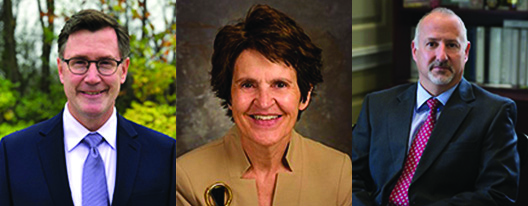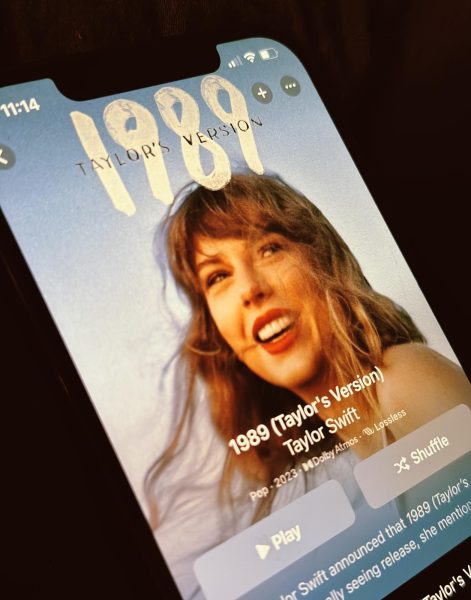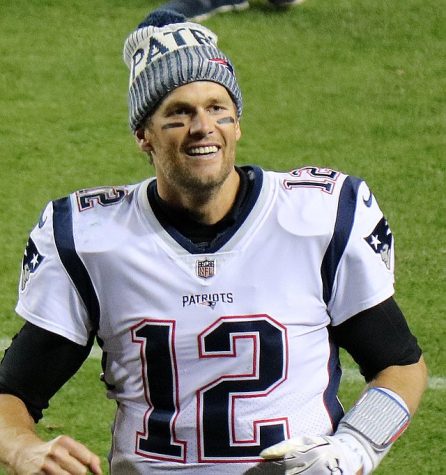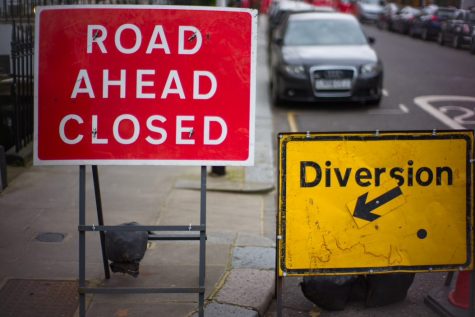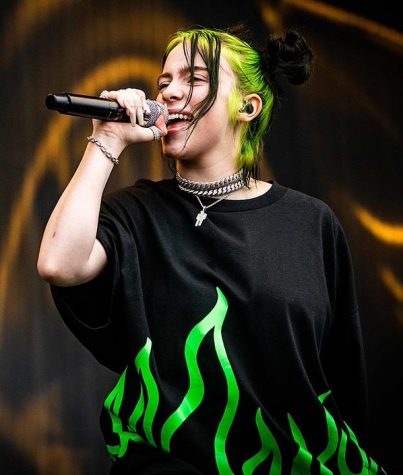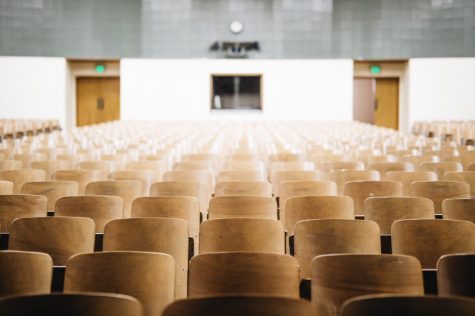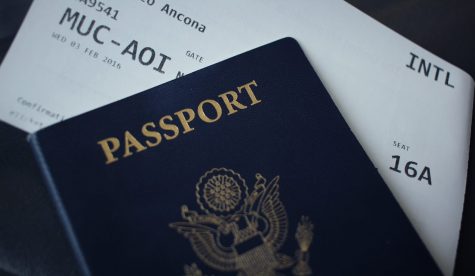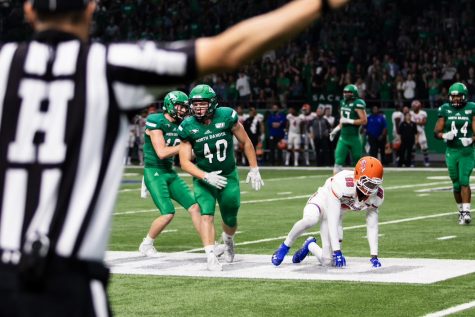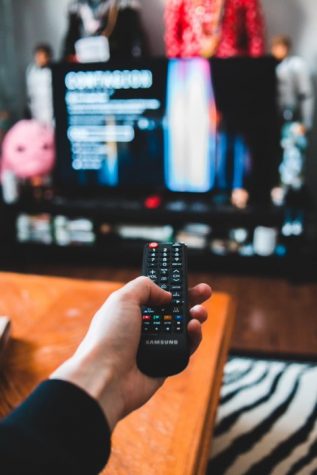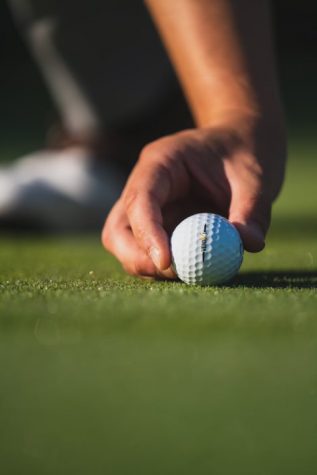- #dakotastudent
- College
- Dakota Student
- Fighting Hawks
- Grand Forks
- Greek Life
- Mason Dunleavy
- ND
- News
- North Dakota
- Showcase
- Student Life
- UND
Three Finalists for the UND Presidency
December 1, 2019
The University of North Dakota held community forums for the six candidates for the UND presidency, now only three candidates remain. The three finalists for the position are Dr. Andrew Armacost, Dr. Laurie Nichols and Dr. David Rosowsky. With a wide array of states being represented in the president search, the community had questions for each candidate on how their experience will help build on UND’s potential.
Each candidate started their forum with a brief introduction into their lives and how they feel they fit into the presidency position.
Dr. David Rosowsky
Dr. Rosowsky was the earliest of the three candidates for the community forums, his was held on Nov. 15.
Q: What is your perspective on flagship universities such as UND and how it should balance its responsibility for teaching and being an economic engine and promoter of commercialization with its intellectual talent and knowledge?
A: “I think those are two pillars of what a public flagship university should be involved with. I think the pillars of public flagships are teaching, learning and discovery research. It’s not inappropriate to have focus and energy and resource investment into all three of those.”
Q: What work have you done in the areas of diversity and inclusion and what would your priorities in those areas be?
A: “In Vermont, there are fewer than 2% of people of color. Campus (University of Vermont) faculty and students are between 11 and 12% of people of color. In my tenure as provost and senior vice president, I hired 24 senior leaders. Of the 24 higher senior hires 12 were women, so 50% and six or 25% were people of color.”
Q: Some people view marketing as an expense, others view it as an investment. Where do you stand in that spectrum?
A: “I don’t mean to be smug, but it’s a necessary investment of resources that’s extremely strategic. If you are not savvy in that space, you will be lost. Not because you don’t have a good story to tell, but because other people are telling their stories better.”
Q: How far do you think the police should crack down on things like underage drinking that are normal and accepted in university community in the broader general American public?
A: “My concern has always been for the safety of our people first. Our students are precious and families are entrusting them to us. We have to make it clear that their existence (Campus Police), their presence and their strategies are there to protect students and keep them safe. I think underage drinking is not something to be taken lightly or glossed over.”
Although no questions were asked relating to athletics at UND and if Dr. Rosowsky supported a strong athletic department, his wife, Michelle, noted that Rosowsky has a strong sports background.
“He’s a huge athletics fan and that’s just such an awesome benefit of being part of a campus community.” Michelle said.
Dr. Laurie Nichols
Dr. Laurie Nichols was the next finalist to have a forum, which was held on Nov. 19.
Q: How would you describe your leadership style?
A: “I just think a really good leader will also be a very good listener and I try to do that on a daily basis. I really believe that coming in and spending a lot of time listening to people on campus, the people of the state, the alumni, will be important. It will be important for any president that you hire.”
Q: What are some things you did at the University of Wyoming to improve employee morale in the midst of the budget cuts?
A: “Yeah, that was a very difficult time. It hit me the day I walked in. It was the most challenging thing that I’ve encountered professionally. For those who don’t know, the day I started at Wyoming I was handed a $50 million budget cut and we had about six weeks to get much of it done. So one thing I did right away and it took me about six months to get it done, but I insisted to go across campus and meet with every unit face to face for about an hour and a half and just talk to them. There were two rules, no powerpoint and no food, so that was the premise we worked off of and it really was just to have a conversation.”
Q: Can you talk a little bit about the interaction with the city, but also with service-learning components?
A: “I was able to meet with city leaders this morning in the first session. It was great. I thought we had a great discussion and again, I really learned a lot about it. One thing they said, by the way, is the relationship between UND and Grand Forks has never been better. I would say that there should never be perceived to be a wall between the campus and the community. The more hands-on experiences they can have through internships, sometimes part-time work or service-learning and the like, the more they can better their education.”
Q: How would you feel about supporting the athletic department so that they improve their successes and frankly, make it more fun to connect to alumni like us?
A: “Well, athletics is such a critical part of the university because it’s really the most visible part of the university. It’s an experience that many people can have with the university by attending athletic events and it quite honestly can conjure up a lot of enthusiasm and excitement for the university. So it can be a real kind of, I guess, a galvanizing force if you will, for the university, which is very very important.”
Q: How would you offer to make the campus more diverse and inclusive?
A: “So, I’ll use South Dakota as my example since I spend so much time there. South Dakota, much like North Dakota, has a very high Native-American population. In fact, even more than here. About 10 to 12% of the population in South Dakota are Native-Americans and there are nine reservations in that state. And yet, when I looked at student demographics of SDSU (South Dakota State University), only 2% of our students are Native-American. So there’s a big gap. It was obviously a population that needed much more attention and diligent outreach to. If you’re not attending to the diversity needs and the underserved population needs in one state it’s pretty hard to make a case that you’re going to go three states away and try to do other diversity work. And that’s what I mean when I say start at home, do a good job here.”
Dr. Andrew Armacost
Dr. Andrew Armacost ended the forums on Nov. 21.
Q: How did you get the moniker ‘Uncle Andy’?
A: “It was bestowed upon me probably in the Fall of 2016 due to actions of care and support for the students. Doing simple things like when the hot water goes out in the dorms. It’s not my responsibility (to fix the water), but it is my responsibility to make sure that the students are doing okay. And so, taking the time to just walk through the dorms and talk with the students really earned the respect of the student body and as a consequence, they bestowed upon me the nickname that you just mentioned, Uncle Andy.”
Q: The presidency sometimes requires you to make a tough decision to fire somebody or shut down a program, do you have any experience with that and can you share that experience?
A: “I don’t know if the crowd remembers the federal budget cuts of 2013 called the sequester, so the federal budget was reduced significantly. As a consequence, the money to the Academy was dramatically decreased. We were mandated to reduce ten programs and reduced our general education program by three requirements. Okay, so how do you do that because there’s an impact on livelihoods and an impact on students. So what we made sure of was that no student was impacted. The phase-out of any program would not impact any current students. My number one priority was to make sure students and faculty weren’t negatively impacted.”
Q: Our hockey team is in a good position, but our other sports have had a hard time transitioning into Division I. Would you support other sports on campus and if so, how would you do that?
A: “I was a Division I athlete myself, although a short-lived career of three months. Joe Girardi was my catcher. He was a senior and I was a freshman. He convinced me to quit baseball, but not in the way that you think. He would throw it to the mound faster than I could pitch it. So, Division I sports has a spot near and dear to me. I’ve seen the goodness of what happens by bringing athletes to campus. The time management, the focus that emerges from our student-athletes is second to none.”
Q: How do you make sure resources exist to help students succeed?
A: “Programs like our Academic Support Center. We’ve been able to increase retention from 78% as the long term average to about 85%. That’s through tough deliberate effort through offering second chances, and third chances sometimes fourth chances academically for people to succeed and making sure they have the support services that they really deserve.”
Other questions were asked during each forum. If interested in watching each forum, there’s an email that was sent to all students with the link or go to https://und.edu/about/president/search/#d20e146-1.
The next president is anticipated to begin on or before July 1, 2020. The final decision will be from the State Board of Higher Education on December 3.


